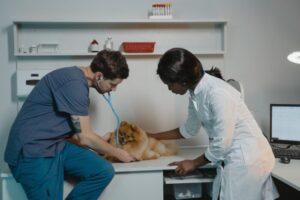How to Choose a Holistic Veterinarian for your Dog (10 Tips)
You want your dog to live a long and healthy life, and you want to do this as naturally as possible.
One of the people that can help you achieve this is a Holistic Veterinarian. A Holistic Vet is a fully licensed Doctor of Veterinarian Medicine (DVM) with expertise in natural, complementary therapies. A holistic vet looks for underlying reasons for illness rather than simply suppressing symptoms. A holistic vet will offer natural therapies before conventional pharmaceutical drugs and surgery, when possible.
Top 10 Tips for Choosing a Holistic Vet
Here are the top 10 tips for choosing the very best Holistic Vet for your pet:
1. Broaden your search criteria.
Include a variety of titles in your online search. Try “Holistic, Integrative or Functional Veterinarian”. Although there are some differences, they share the same philosophies and natural approaches.
2. Aim for a location that’s close, but be prepared to travel.
Holistic vets are harder to find than conventional vets, so you may need to travel a bit further. Ask if virtual visits are possible. If you can’t find a local Holistic Vet, it’s still worth the drive for non-emergency care; just make sure you have a Conventional Vet and/or emergency vet hospital on speed dial. If your dog is in crisis, you don’t want to be driving 2 hours for care. Extra driving time adds stress to you and your dog.
 3. Ask about hours of operation and how after-hours emergencies are handled.
3. Ask about hours of operation and how after-hours emergencies are handled.
Evening and weekend appointments can be helpful. Ask if they have emergency facilities. If they don’t, find out where the closest emergency vet is located or tap into your conventional vet for times when your dog is injured or acutely ill. Some Holistic Vets don’t take emergencies or perform surgeries and will only treat “outpatients”. Make sure you have the care you want for non-urgent appointments and emergencies.
4. Ask for recommendations.
Talk to dog owners in your area. Ask about their experiences with holistic vets. Join a neighbourhood chat group to get opinions. If your circle of dog friends don’t know of one, try asking your own naturopathic doctor or chiropractor for suggestions. They may be “in the know”.
5. Ask if the vet has experience with your dog’s breed.
Although most vets are qualified to care for all dogs, you may want to look for someone who has a special interest in your dog’s breed, especially if you have an uncommon breed. On the other hand, some holistic vets work in rural areas with farm and working animals, but still offer excellent care to dogs.
6. Ask if they are willing to work with other canine health care providers.
You may want a variety of specialized care providers on your dog’s health care dream team. Your potential Holistic Vet should be open to working with a conventional vet, canine chiropractor or other specialist. If you plan to have a conventional and holistic vet on your team, be open with both and ensure they communicate with each other to develop a treatment plan that you all agree with. This can be a frustrating process, but persevere and your dog will reap the benefits of comprehensive health care and an effective team. If you’re not sure about the options you have for your dog’s health care team, learn about them here.
7. Ask if your dog will have a primary vet.
Some clinics hire several vets or work in a team model, where your dog may have a different vet or student vet each time they come in. Although not essential, it is beneficial to have one consistent vet who you develop a relationship with and who knows your preferences.
 8.Tour the clinic with your dog
8.Tour the clinic with your dog
-
- Check the parking lot for adequate parking and accessibility. If you have a big dog or one who has trouble walking, ramps are preferred.
- Look around to see how clean the space is. Are “accidents” cleaned up? Does it smell fresh without the use of strong chemical cleaning products? Are vets and vet technicians wearing clean scrubs free of stains, mud or body fluids? Is there space between the chairs in the waiting area so stressed dogs have their own space?
- Ask to see the “back” of the clinic. This is where your dog may have to stay overnight for treatments or to recover from surgery. Crates, cages or confined areas should be clean without rusty bars, locks or dangerous items. Blankets should be clean and neat without any holes or frayed spots. If there is a bowl of water in the crate, it should be fresh.
- Ask about supervision. Does a vet tech stay with the animals when they are recovering? Do staff stay overnight? Are there security cameras? Do staff monitor the cameras?
9. Notice how your dog reacts.
Although it’s normal for your dog to be nervous, look for signs of distress, fear or aggression. You want a clinic where the staff are calm, kind, compassionate and not rushed. If your dog is stressed, you want staff to make an effort to make your dog comfortable.
10. Compare Prices.
Costs shouldn’t be the deciding factor for health care, but it’s a reality and, it can be expensive. Ask for an estimate for a specific examination or procedure and call around. If the fees are different, ask why. They may include additional services or products. If you plan to use pet insurance, ask if the services of a Holistic Vet are covered. Compare prices for natural and conventional products for common issues like flea prevention. Often natural approaches cost less and are just as effective.
If you follow these tips, you are well on your way to choosing the perfect Holistic Vet!
Learn about other health care options for your dog
Want the top tips for choosing a Conventional Vet? Check this out







